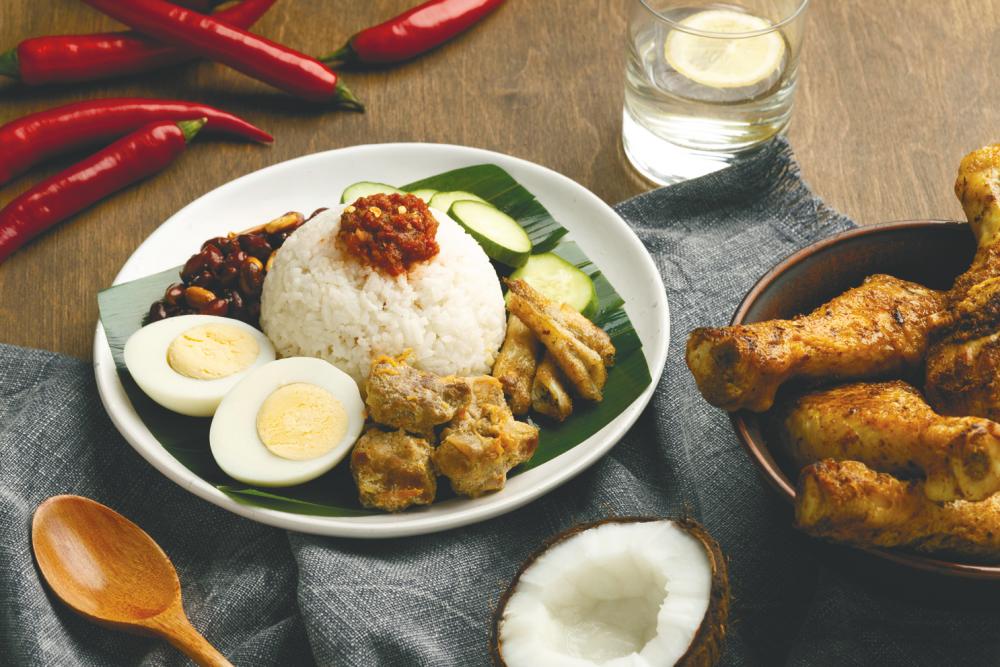WITHOUT mincing words, Malaysia is the most obese country in Southeast Asia. This was revealed nine years ago by UK medical journal, The Lancet.
Six years later, in the 2019 National Health and Morbidity survey, 50.1% of the country’s adult population were reported to be overweight (30.4%) or obese (19.7%).
Since then, it has become worse, with the various lockdowns stemming from Covid-19 driving up physical inactivity, with mental health dips further contributing to stress eating.
The following are important things to keep in mind when it comes to changing eating habits.
Less is more
As an Asian country, rice and noodles are commonplace and are main components for most dishes, and it’s hard to imagine life without either.
But instead of attempting to eliminate rice and noodles from daily consumption entirely, how about limiting the quantity eaten?
Most of Malaysians take their rice consumption for granted without knowing the true extent of overeating it.
One rounded tablespoon of cooked rice contains roughly 35 calories. Most plates of rice dishes, like fried rice, contains about 12 tablespoons of rice. That’s around 420 calories, and it’s not accounting the trickle calories from external ingredients added to or eaten with that one meal of rice.
An adult male requires an average of 2,500 calories, while for an adult female its 2,000 calories. It’s not hard to imagine how easy it is to overshoot the daily caloric requirement when your first meal of the day, like a harmless plate of nasi lemak with an egg or fried chicken easily ranges between 450 to 800 calories.
And then, on top of that, you have lunch, teatime, dinner and maybe even supper. In between all of that, maybe you’re drinking sugar-laden drinks or snacks.
Calories add up, and the first step in cultivating healthier eating habits is adjusting to eating less than you normally do. Once old habits are rewritten, everything else falls into place easier.

No fads
Fad diets are just that – fads. Most are peddled by influencers seeking to leverage on desperate individuals looking for shortcuts, with many either outright not working from a scientific standpoint, or just not being feasible or sustainable.
A lot of these fad diets work short term, or whose “success” just consists of temporary placebo effects. Take for example the highly popular keto diet.
This diet villainises carbohydrates and practically makes them out to be something akin to Satan, and requires “practicioners” to either severely reduce their carb intake or cut it out completely. When this happens, the body starts to lose weight, and it creates the illusion of “Wow, I’m losing weight. The t-shirts fit again. I can get up from the bed without wheezing and breaking into a cold sweat”.
However, the reality is that its just massive amounts of water weight that was lost due to depriving the body of carbohydrates, and not actual weight reduction in terms of body fat. Then the unsustainable part kicks in, and the individual relapses into their old eating habits, and the weight comes back with a vengeance.
Granted, there are actual success stories for the keto diet or any other fad diets, but these are by people with actual discipline, who strictly adhere to the rules. Can you sit there, and say with a straight face that you have the discipline to carry on with one of these restrictive diets over a long period of time?
So, don’t get into any fad diet to cut corners and magically hope to eat and live healthier within a few weeks of stopping yourself from eating bread.
Phase out processed food
Yes, I know, this is easier said than done, especially since that Ramly beef burger is so delicious. However, this article isn’t peddling “Go organic”, because that’s too expensive. But there are healthier alternatives. For example, instead of bagged potato chips, make your own with real potatoes using an air-fryer.
The reality of the matter is that processed foods are outright unhealthy and add zero benefits for anyone other than satisfying cravings and getting a brief dopamine hit.
Most of these foods are considered “satiating, high-density caloric foods”, and they’re engineered – quite literally – for humans to continuously chase after for that next ‘hit’, like a drug addict, because processed foods are so cheap, satiating and readily available.
There is a popular quote by an American podcaster and comedian that highlights this problem that stems from capitalism: “Poor people are fat today. Think about that ****.”

Education is important
Instead of having moral classes, maybe Malaysian schools need subjects on food nutrition. I’d say that’s more important than having kids do gotong-royong assignments. But that’s beside the point, sort of, because educating oneself about what you put into your own mouth is very important.
There have been countless studies and research done on the effects of different types of food on important hormones and bodily functions within humans, and guess which types of food leads to stronger mental and physical fortitude?
Knowing how to count calories, which cuts of meat, types of protein, types of fat, and so on, can be daunting, but the first steps to improving eating habits through self-education is crucial to lay the groundwork towards not just improving how you look, but also how you function, physically and psychologically.









